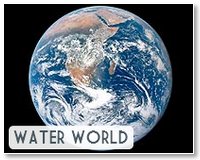| . |  |
. |
Dhaka, Bangladesh (UPI) Apr 21, 2010 Soldiers are guarding water pumps in Dhaka, the capital of Bangladesh, as the city of 7 million faces severe water shortages. While water shortages are typical during the April-May dry season, it has been especially bad this year, getting a start in March with unusually high temperatures. The city needs 581 million gallons of water a day but can only produce 502 million, said the country's national Water Supply and Sewerage Authority. "The army will work in coordination with the water authority to properly manage water distribution in the city," Golam Mostafa, chairman of the Dhaka Water Supply and Sewerage Authority, told IRIN, the U.N. news agency. For residents, that means each person is allowed to fill one jug, approximately 1 gallon, under armed guard. Family members typically wait on line together to multiply the ration. One woman told the Express about a 3-hour wait to fill her jug. Although Dhaka has 546 water pumps designed to supply water, more than half aren't equipped with back-up generators, so they don't function during the frequent power outages in the capital, exaggerating the effects of the dry spell. The country's daily electricity output totals approximately 3,800 megawatts against a demand of 6,000 megawatts, leaving a supply crunch of 2,200 megawatts. Last month the Financial Express newspaper reported Bangladesh Finance Minister Ama Muhith as saying the country's energy and power crisis is the "worst" in South Asia, warning that there was no "quick-fix" for boosting supply. The Express reported an unnamed government official estimating the country's water crisis wouldn't improve until August or September because WASA was still waiting for government approval to purchase new electric generators to power about 200 water pumps. About 87 percent of the city's residents depend on piped water from deep tube wells for their water supply and the remaining rely on treated surface water. Lack of electricity has made it impossible to pump an adequate supply of water from lower depths. When there is water, it isn't clear and has a foul odor to it. "For the last two months, we have been receiving dirty and bad-smelling water," said 25-year-old Monir Hossain, a resident of the Shantibagh sub-district, IRIN reports. Since the beginning of April, up to 1,000 people have been treated daily for water-borne diseases, compared to an average high of 300 people, health experts said. The World Health Organization stated in its 2010 Global Annual Assessment of Sanitation and Drinking Water report that more than 30 million people in Bangladesh don't have access to safe drinking water.
Share This Article With Planet Earth
Related Links Water News - Science, Technology and Politics
 Arab-Israeli water feuds get worse
Arab-Israeli water feuds get worseRamallah, West Bank (UPI) Apr 16, 2010 Israel's feud with the Palestinians over dwindling West Bank water resources stymied an EU effort this week to secure a water management strategy for the Mediterranean region where 290 million people face shortages by 2025. Last month, Israeli troops killed a 16-year-old Palestinian and critically wounded another teenager in a clash with Jewish settlers over a well near the city of flas ... read more |
|
| The content herein, unless otherwise known to be public domain, are Copyright 1995-2010 - SpaceDaily. AFP and UPI Wire Stories are copyright Agence France-Presse and United Press International. ESA Portal Reports are copyright European Space Agency. All NASA sourced material is public domain. Additional copyrights may apply in whole or part to other bona fide parties. Advertising does not imply endorsement,agreement or approval of any opinions, statements or information provided by SpaceDaily on any Web page published or hosted by SpaceDaily. Privacy Statement |